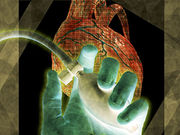Low DBP linked to myocardial damage, CHD events especially among those with SBP ≥120 mm Hg
TUESDAY, Aug. 30, 2016 (HealthDay News) — Low diastolic blood pressure (DBP) is associated with subclinical myocardial damage and coronary heart disease (CHD) events, according to a study published online Aug. 30 in the Journal of the American College of Cardiology. The research was published to coincide with the annual European Society of Cardiology Congress, held from Aug. 27 to 31 in Rome.
John W. McEvoy, M.B., B.Ch., from the Johns Hopkins Bloomberg School of Public Health in Baltimore, and colleagues analyzed data for 11,565 adults from the Atherosclerosis Risk in Communities study to examine the independent association of DBP with myocardial damage and with CHD events over 21 years.
The researchers found that the adjusted odds ratio of having high sensitivity cardiac troponin-T (hs-cTnT) ≥14 ng/L at baseline was 2.2 and 1.5 for those with DBP <60 mm Hg and 60 to 69 mm Hg, respectively, versus 80 to 89 mm Hg. On the basis of estimated annual change in hs-cTnT over the six years between visits two and four, there was an independent correlation seen for low DBP at baseline with progressive myocardial damage. Among patients with baseline systolic blood pressure (SBP) ≥120 mm Hg, the correlations of low DBP with prevalent hs-cTnT and incident CHD were most pronounced.
“Particularly among adults with an SBP ≥120 mm Hg, and thus elevated pulse pressure, low DBP was associated with subclinical myocardial damage and CHD events,” the authors write
Several authors disclosed financial ties to the pharmaceutical and medical device industries.
Full Text (subscription or payment may be required)
Editorial (subscription or payment may be required)
More Information
Copyright © 2016 HealthDay. All rights reserved.








